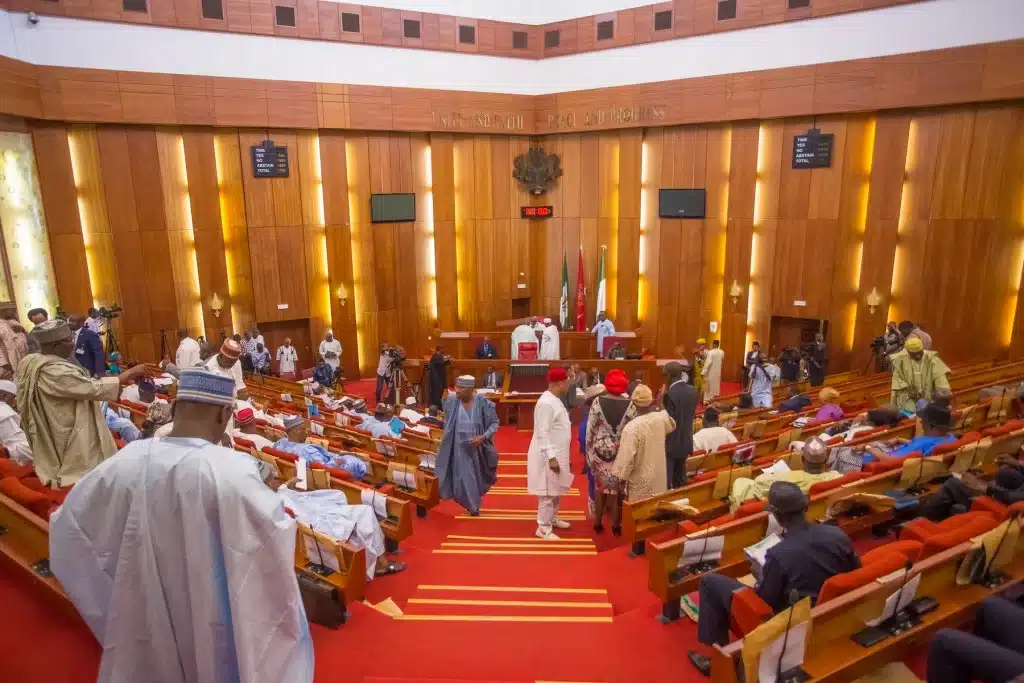The Nigerian Senate has announced the suspension of further action and public hearings on the contentious Tax Reform Bills, citing the need for broader discussions to address unresolved issues.
The decision was disclosed during Wednesday’s plenary by Deputy Senate President Jibrin Barau, who emphasized the Senate’s commitment to fostering dialogue and collaboration.
Barau highlighted the Senate’s role as a stabilising force, particularly in times of national discord, and reaffirmed the legislative body’s resolve to prioritize national unity over political, ethnic, or regional differences.
“As the highest legislative institution, we are committed to resolving contentious issues through dialogue. The Senate has always stood as a beacon of stability, and we aim to work collaboratively to achieve a resolution that advances Nigeria’s collective progress,” Barau stated.
Acknowledging Nigeria’s pressing economic and security challenges, Barau revealed that the Senate and the Executive have agreed to establish a forum to address the contentious aspects of the tax reform proposals.
He further noted that the Judiciary would be involved in the discussions to ensure legal clarity and consensus.
“We have decided, in collaboration with the Executive, to engage the Attorney General of the Federation and other stakeholders to resolve outstanding disagreements. This approach will ensure that all concerns are addressed comprehensively and transparently,” he added.
READ ALSO: Tax reforms bills: Analysts weigh in on implications for Nigeria’s fiscal policy
In line with this decision, the Senate Committee on Finance has been directed to suspend all further actions on the Tax Reform Bills, including public hearings, until a consensus is reached.
Barau explained that this pause would allow for in-depth discussions and the formulation of a more acceptable framework for tax reforms.
Barau assured Nigerians that the Senate leadership, in conjunction with committee members, would work closely with the Attorney General and other stakeholders to address lingering concerns.
“Resolving this matter requires setting aside all differences and focusing on what unites us as a nation. We are confident that these consultations will result in tax reforms that are fair, inclusive, and supportive of Nigeria’s development objectives,” he said.
READ ALSO: Tax reforms bills: Analysts weigh in on implications for Nigeria’s fiscal policy
The suspension has drawn mixed reactions from economic analysts, with some applauding the decision as a step towards inclusivity, while others expressed concerns over potential delays in addressing critical fiscal challenges.
Dr. Funmi Adewale, an economist, described the move as “necessary for achieving a balanced tax framework,” adding that “broad stakeholder engagement is crucial to avoid unintended economic repercussions.”
However, fiscal policy expert Dr. Isa Al-Hassan urged the Senate to expedite consultations, warning that prolonged delays could stall efforts to boost revenue generation.
The Senate plans to reconvene on the matter after consultations with the Executive, Judiciary, and other stakeholders. The outcome of these discussions is expected to shape the final content and direction of the tax reform proposals.
As Nigeria grapples with economic challenges, the Senate’s approach underscores the importance of inclusivity and dialogue in crafting policies that reflect the aspirations of all Nigerians.

 Entertainment1 week ago
Entertainment1 week ago
 Entertainment5 days ago
Entertainment5 days ago
 Comments and Issues1 week ago
Comments and Issues1 week ago
 Comments and Issues1 week ago
Comments and Issues1 week ago
 Comments and Issues1 week ago
Comments and Issues1 week ago
 Health7 days ago
Health7 days ago
 Health3 days ago
Health3 days ago
 Football7 days ago
Football7 days ago

